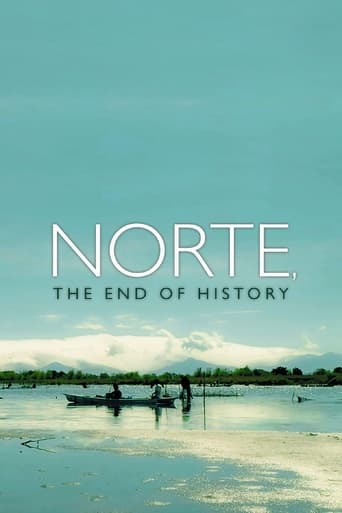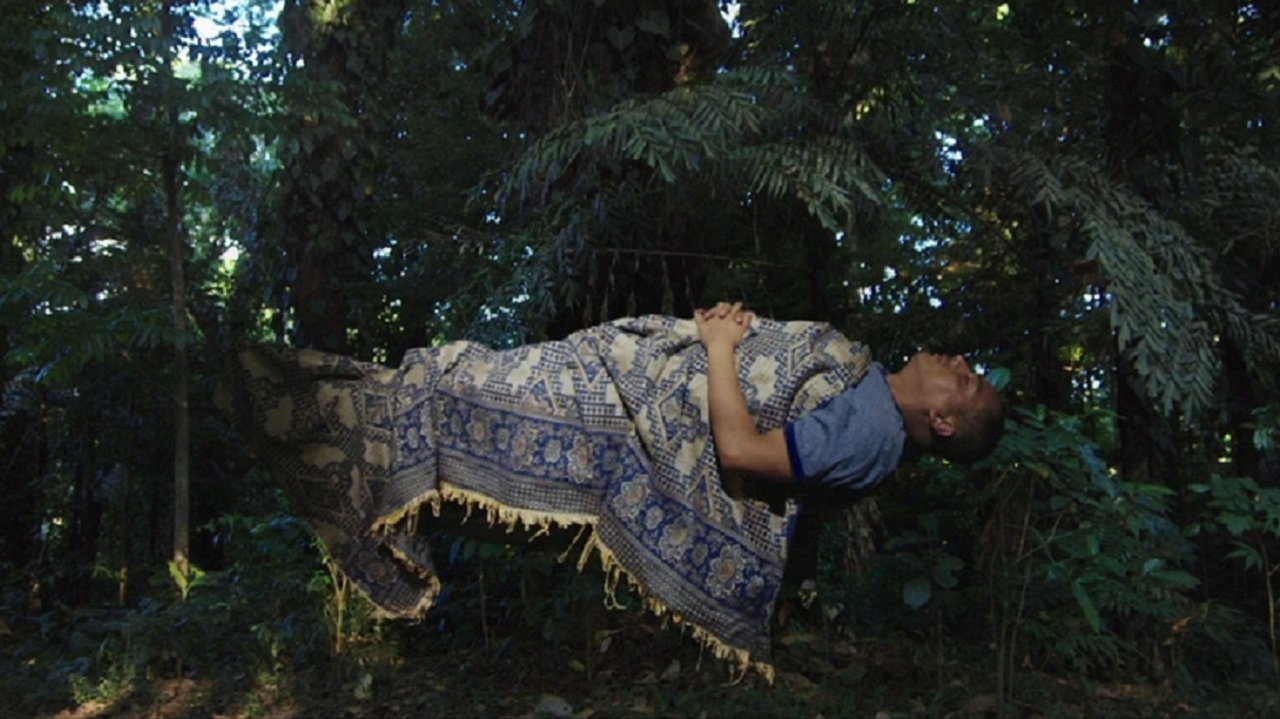plsletitrain
Lav Diaz is famous (or infamous) for long runtimes. This one isn't too long (for Diaz's standards) but it is quite long and stretchy. If it was cut down to say, a 3-hour runtime, the story would still be effectively told. Nonetheless, the film still managed to hold my attention. Throw me a movie with a countryside view, a laid-back province environment, a village by the sea, and a green scenery, and I will surely glue my eyes on it.The movie revolves around the lives of 3 central characters, played by versatile and veteran supporting casts. These central characters I'm referring to are 1) Fabian- a genius turned lunatic 2) Joaquin- a family man indicted for a crime he never committed and 3) Elisa- the perfect example of a strong woman. It's so hard to choose which of the three characters most affected us, or who most most realistically depicts how sad and cruel society is. Their lives are so colorful that in the turn of events, one can only ponder on how cruel can fate be. I would give a special shout out to Sid Lucero, who plays Fabian in the movie. Fabian is an interesting character. He was a former law student whose intellect could have made him bar topnotcher. He likes talking about philosophy, conspiracies, politics, history--smart man. But I guess what he had in intellect, he lacked in rational thinking. He ran out of his mind because he was probably eaten by guilt. He was someone who can't control his emotions. And this led him to do crazy things. And this, ladies and gentleman, was very well acted by no less than Sid Lucero. I can't even think of someone else doing the role than him. Then again, Sid Lucero has already proved his versatility and craftsmanship that it's no longer a question.At first I didn't know what's the relation between Norte and the movie. I found out later on that the film was shot in the northern most part of the island of Luzon in the Philippines. Thus, the "North". As to the "end of history" part, well, it could be both literal and metaphorical. The movie has serious and deep themes which spices up the whole movie. There's murder, poverty, guilt, judgement, incest, hope, faith, longing, remorse...name it. All of these are depicted in the three lives connected to each other by fate. The no. 1 strength this movie has to offer is the brilliant performances from the actors. They brought the whole story, which is already great by itself, even greater.
d-JCB
An absolute masterpiece from Philippines, inspired by Fyodor Dostoevsky's "Crime & Punishment" but told through real events & political / social problems of the director's country
This is the first 4 hour movie that didn't even feel that length, perfectly paced, beautifully shot, deep & reflective, gripping & awe inspiring
this is the human condition in it's most naturalistic state
Can't wait to see another one of this brilliant film makers films which have running times up to 11 hours
a masterpiece that will take some time to wipe form your memory
http://samuellbronko.tumblr.com/post/117757930882/norte-the-end-of- history-2013-lav-diaz
Turfseer
Anyone who has sat through the epic four hour plus "Norte, The End of History," deserves a medal. "Norte" is the product of Lav Diaz, the Filipino auteur who has already completed seven films that are even LONGER than this one! When he wishes to introduce each new scene, Diaz has a penchant for holding establishing shots for a minute or two, which can be infuriating. Be forewarned: there is some interesting material here but one has to be extremely patient to appreciate any of it!Diaz's "Norte" is set in the Phillipines and revolves around three interconnected characters. The prime mover (and perhaps most interesting of the three) is the antagonist, Fabian, a law school dropout who seeks to punish anyone who transgresses his personal moral code. Fabian's idea is to eliminate the "bad elements" in Filipino society. While his friends agree that society must change, Fabian, the bitter psychopath and reactionary, berates all those who believe in "all talk and no action." In contrast, husband and wife Eliza and Joaquin, come from a poor background and are dependent on a local moneylender, Magda, for their sustenance. When Eliza pawns a precious family ring, Joaquin tries to convince Magda to sell it back to him. When he can't pay her price, Joaquin impulsively chokes Magda and runs off after a housekeeper witnesses the event. Later, Fabian is passing by on the street and sees Magda turn Eliza away at her door, after requesting another loan. Magda's rough treatment of Eliza is enough justification for Fabian to later enter Magda's home and kill the moneylender along with her innocent teenage daughter.Joaquin is later implicated in Magda's murder (due to the circumstantial evidence against him) and is forced to accept a plea bargain of life in prison. Eliza is forced to sell vegetables on the street for a living, in order to take care of her children, who are in the care of a family friend. Meanwhile, Joaquin must adjust to prison life and survives a brutal attack by a predatory inmate. Later that inmate falls sick and Joaquin, in true Christian fashion, ministers to him, in a great act of forgiveness.Echoing Dostoyevsky's "Crime and Punishment," Fabian is haunted by the memory of committing the two murders and eventually digs up money he had stolen and later buried from Magda's house and gives it to Eliza. Fabian, however, remains deeply troubled and on a visit to his sister, who owns a large farm, ends up raping her.Now with a little money, Eliza is finally able to visit her beloved Joaquin. On the way back, she tragically dies in a plane crash. We see Joaquin (apparently now deceased) levitating, as if he's moving closer to God, attaining some kind of sainthood. Can we assume that Joaquin killed himself or died from grief, following the death of Eliza in the plane crash? Possibly but it's not entirely clear.The randomness of the death of two good people, Eliza and Joaquin, is contrasted with Fabian, an evildoer, who very much continues to live. Perhaps Diaz is saying sometimes there is no justice in this world and perhaps no God. Diaz hints that perhaps there is still hope as one of the concluding shots focuses on the innocent children of Eliza and Joaquin, who survive, along with the farm animals, who also represent innocence.Neil Young writing in the "Hollywood Reporter," finds Diaz's characters lacking in complexity: "Fabian's transition from preening bohemian chatterbox to bestial psychotic is seldom convincing, but at least his character gets to change a little over the course of the years. Joaquin and Eliza are little more than plaster saints from beginning to end in a film which simplistically equates poverty with spiritual purity and fortitude."Peter Sobcynski of "RogerEbert.com," notes that there "are moments of staggering beauty and power on display here," but also notes there are numerous scenes which are quite lugubrious or gratuitous: "The trouble is that there are also extended sequences in which so little happens that the effect is more tedious than hypnotic
This is mostly due to a screenplay that grows less and less psychologically sound the further it drifts from its inspiration—there is a long sequence when Eliza contemplates killing herself and her children that feels like a cheap shot and some of the cruelties on display in the final hour feel like attempts to jolt viewers that may have inevitably drifted off during the slower parts. For these moments to fully work, a filmmaker has to have earned them, and there are times in which Diaz hasn't completely done that."A.O. Scott, writing in the "New York Times,"holds that "Norte's" value is connected to Diaz's social critique: "Mr. Diaz, patiently surveying the social and physical landscape with his beautiful, asymmetrical wide-screen compositions, makes inequality seem like an aspect of the local climate. The cruelty of laws and economic arrangements is obvious and intolerable, and yet there is no real sense that anything can be done.""Norte, The End of History," does indeed highlight the tragedy of poverty and its attendant sense of class inequalities. Again, if you're patient enough to ignore some of the more tedious moments in the film, you'll be rewarded by scenes of what A.O. Scott terms, the film's "inexhaustible humanism."
Mina Radovic
Norte: Hangganan ng Kasaysayan (Norte, the End of History) clocking in at 250 minutes is utterly breathtaking in scope and visually remains a staggeringly beautiful, poetic masterpiece. On a symbolic level, it is a transcendent story of exploration, self-discovery and redemption, realistically portraying the strength, and equal fragility, of the human condition. The film elaborately investigates the relationship between man and his socio-political circumstances - in this case the extreme poverty of the Philippines in correlation with brutal capitalism on the rise. Most importantly however it explores the spiritual relation between humanity and God.Lav Diaz pushes the boundaries of the medium with this tour de force, visually and thematically, leading us on a long, contemplative journey of discovery. Through his deeply intimate approach and glorious camera-work he represents human frailty at its most basic, acting as a resolute, poetic meditation on the human condition.Diaz's cerebral masterwork is nothing short of high art, proving him to be one of the true visionaries working in contemporary world cinema.


 AD
AD





